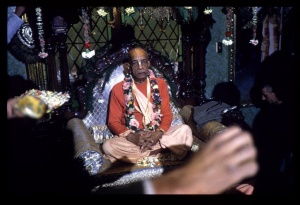CC Madhya 22.109

A.C. Bhaktivedanta Swami Prabhupada
TEXT 109
- rāga-hīna jana bhaje śāstrera ājñāya
- 'vaidhī bhakti' bali' tāre sarva-śāstre gāya
SYNONYMS
rāga-hīna — who are without spontaneous attachment to Kṛṣṇa; jana — persons; bhaje — execute devotional service; śāstrera ājñāya — according to the principles and regulations described in the revealed scriptures; vaidhī bhakti — regulative devotional service; bali — calling; tāre — that; sarva-śāstre — all revealed scriptures; gāya — sing.
TRANSLATION
"Those who have not attained the platform of spontaneous attachment in devotional service render devotional service under the guidance of a bona fide spiritual master according to the regulative principles mentioned in the revealed scriptures. According to the revealed scriptures, this kind of devotional service is called vaidhī bhakti.
PURPORT
In the beginning, one has to hear from a bona fide spiritual master. This is favorable for advancing in devotional service. According to this process, one hears, chants, remembers and engages in Deity worship, acting under the directions of the spiritual master. These are the essential primary activities of devotional service. Devotional service must not be executed for some material purpose. One should not even have a desire to merge into the Absolute Truth. One has to render such service out of love only. Ahaitukī, apratihatā. Devotional service must be without ulterior motives; then material conditions cannot check it. Gradually one can rise to the platform of spontaneous loving service. A child is sent to school by force to receive an education, but when he gets a little taste of education at an advanced age, he automatically participates and becomes a learned scholar. One cannot force a person to become a scholar, but sometimes force is used in the beginning. A child is forced to go to school and read and write according to the instructions of his teachers. Such is the difference between vaidhī bhakti and spontaneous bhakti. Dormant love for Kṛṣṇa exists in everyone’s heart, and it simply has to be awakened by the regulative process of devotional service. One has to learn to use a typewriter by following the regulative principles of the typing book. One has to place his fingers on the keys in such a way and practice, but when one becomes adept, he can type swiftly and correctly without even looking at the keys. Similarly, one has to follow the rules and regulations of devotional service as they are set down by the spiritual master; then one can come to the point of spontaneous loving service. This love is already there within the heart of everyone (nitya-siddha kṛṣṇa-prema).
Spontaneous service is not artificial. One simply has to come to that platform by rendering devotional service according to the regulative principles. Thus one has to practice hearing and chanting and follow the other regulative principles by washing the temple, cleansing oneself, rising early in the morning, attending maṅgala-ārati and so on. If one does not come to the platform of spontaneous service in the beginning, he must adopt regulative service according to the instructions of the spiritual master. This regulative service is called vaidhī bhakti.